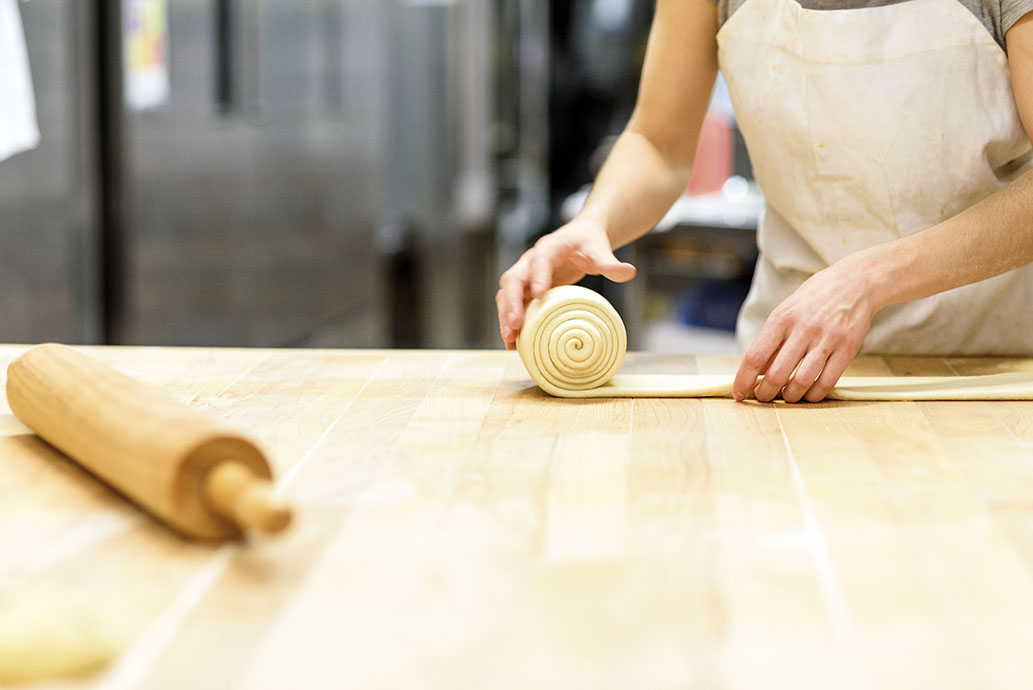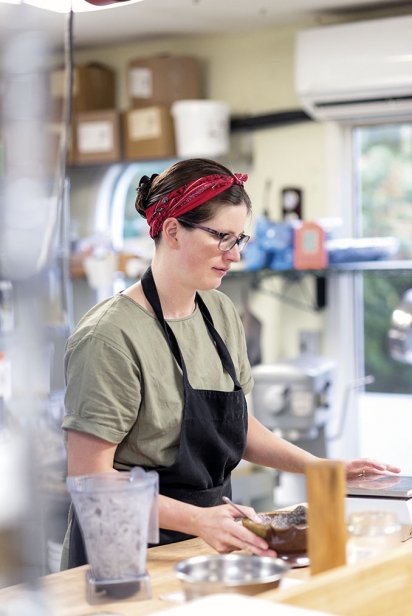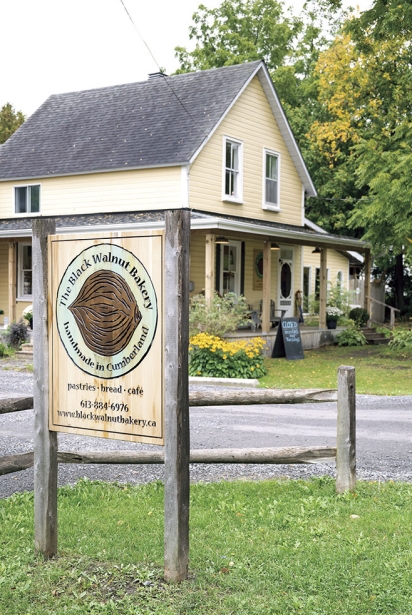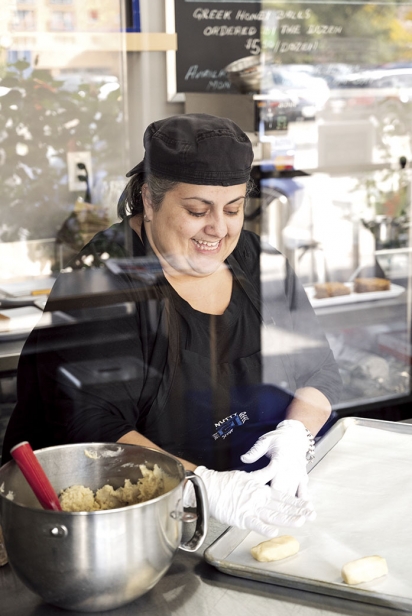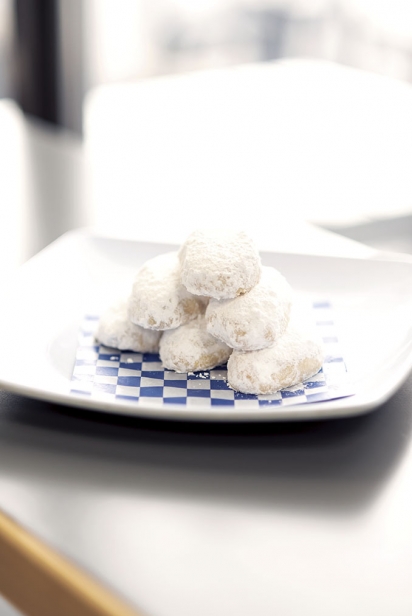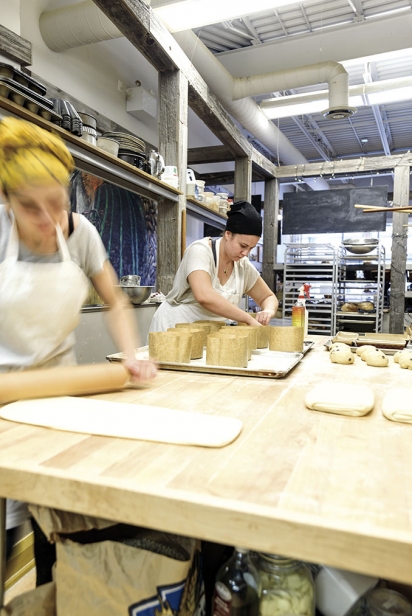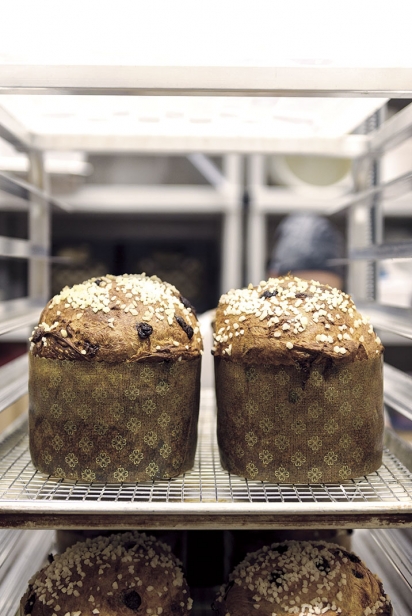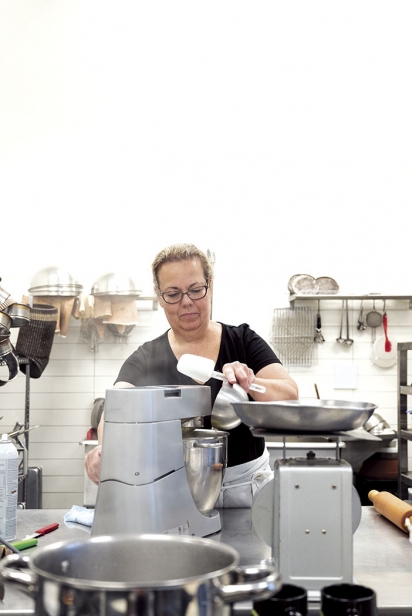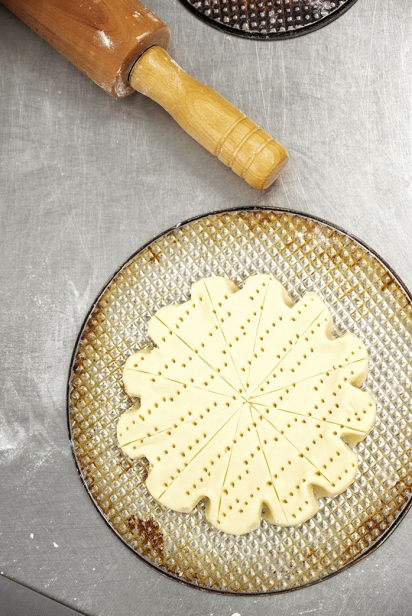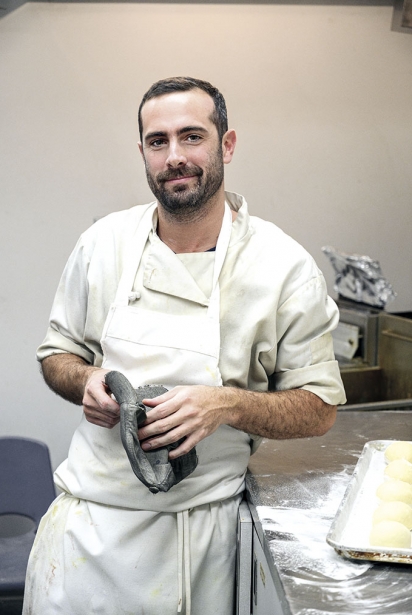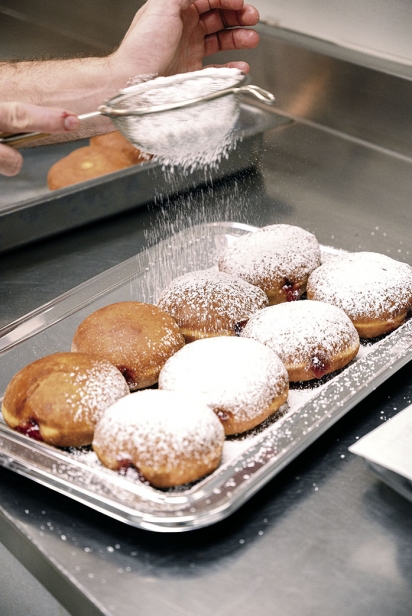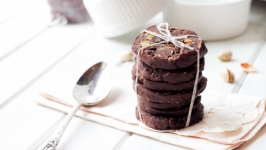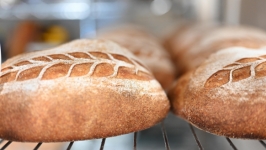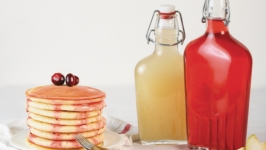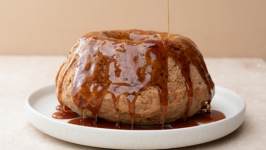A (Sugar) Trip Away from the Ordinary
The tapestry of Ottawa life is beautiful in its diversity. A rich blend of ethnicities colour our neighbourhoods, schools and workplaces, offering us opportunities to discover traditions beyond what we’ve grown up with ourselves.
This holiday season, edible Ottawa spoke with five passionate bakers — from an array of cultural backgrounds — who shared stories of their favourite treats and why they’re still worth making and sharing today.
Nurturing the seeds of a Ukrainian tradition
For Myroslava Mykytyn, the tradition of making Ukrainian makivnyk — a poppy-seed roll — is literally in her blood.
“My grandmother’s last name is Makohin, which means poppy- seed grinder,” she says. “So it’s really funny that makivnyk has made its way into our family history.” Looking back to her childhood, Mykytyn has many positive memories of her family enjoying makivnyk from the Rideau Bakery.
“I was sad to hear that they closed, because that was one of our favourite products from them; my mom would just go crazy over it,” she says, referring to the iconic bakery’s closure after almost 90 years. “I grew up eating makivnyk from Rideau; I used to make it at home on occasion, but I almost never made it as well as they did — I was always striving to get it to be as good as theirs.”
Years later, after opening the Black Walnut Bakery in Cumberland with her husband, Isaac Fouchard, Mykytyn decided to try making it for her customers.
“I came across a recipe in one of our older family Ukrainian cookbooks,” she says. “So my variation is a little bit different from Rideau’s; we put walnuts in it — they didn’t... I really like the combination of raisins, honey, walnuts and poppyseeds; I love that it’s not overly sweet.”
Makivnyk is a roll made with alternating layers of brioche dough — an enriched egg dough — and poppyseed filling. The trick, says Mykytyn, is soaking the poppyseeds and then grinding them into a very fine paste.
“My grandmother taught my dad to make makivnyk, and my dad taught me,” she says. “I remember him being so insistent about the poppyseeds being milky white and pasty; you should hardly see the black anymore. He was pretty critical about that stuff.
“The grinding process makes them smoother so you don’t get that grittiness in your teeth — it’s more of a textural thing.”
Traditionally, those poppyseeds were painstakingly ground to a paste by hand, using a “makitra” — which is an unglazed, ceramic bowl with a rough interior. A large wooden pestle — called “makohin” in Ukrainian — was used to grind the poppy seeds in the makitra.
“The root word for both is ‘mak’ meaning poppy seeds,” Mykytyn explains. “These tools also would have been used in the preparation of kutia, a traditional poppyseed porridge made for Ukrainian Christmas.”
At the Black Walnut Bakery, Mykytyn uses a Vitamix to automate the process. “Because we’re doing them in such large batches here, we don’t do it by hand any more like we used to,” she says.
As many eastern European cultures enjoy poppyseed rolls as part of their holiday tradition, Mykytyn says they constitute the majority of her interested customers.
“It’s a pastry that does cross cultures, but I don’t know if makivnyk has a very strong following by non-eastern Europeans,” she says. “Poppyseeds are a strong flavour, and it’s not one that a lot of people are used to; it’s not a typical kind of treat.” That said, she says she has been surprised at how demand has been growing for it.
“The first year we made it, we only made about a dozen, but every year more and more people are looking for it,” says Mykytyn. “Last year, I was shocked that we sold 95 — our makivnyk sales surpassed our stollen sales.”
Priced at $12 per roll, Mykytyn suggests pre-ordering to avoid disappointment. Note the deadline for ordering Christmas baking is Dec. 15, 2019.
The Black Walnut Bakery
979 Cameron St., Cumberland, Ont.
blackwalnutbakery.ca | 613.884.6976 | @theblackwalnutbakery
Caution: Nibble with care
If you’re invited to a holiday party hosted by a Greek family, you might want to avoid wearing black. That’s because you’ll be sure to find kourabiedes on the dessert menu; these buttery balls of heaven are easily recognizable by the copious amounts of powdered sugar on top.
“They’re called ‘the embarrassment cookie,’ because when you go to eat them for the first time, if you don’t dust it off then you end up wearing it,” laughs Anna Papadopoulos, a partner in the family-owned Nutty Greek Bake Shop on Rochester Street.
Papadopoulos says one of her earliest memories is sitting at the kitchen table while her mother, Christina, made kourabiedes. “My mom always included us; she would sit us down and give us a bit of dough,” she recalls. “It would keep us out of trouble and she could keep an eye on us.”
She and her sister, Eleni, learned everything from their mom, who is still the primary baker at the family business.
When it comes to kourabiedes, the family recipe dictates subtle flavours of almond and Ouzo, an anise-flavoured aperitif.
“Once they come out of the oven and they’re warm, she sprinkles on the Ouzo, and there’s a little bit in the dough too,” Papadopoulos explains. “So you have a little kick of that black licorice flavour, and when you crack the cookie open, there’s a piece of almond on the inside.”
The family hails from the village of Rizes (which means “roots”), Tripoli about two hours south of Athens. Papadopoulos says other regions have their own versions of kourabiedes. Some people bake them with pistachios instead of almonds, and in Cyprus, it’s popular to flavour them with rosewater.
While the classic shape of the cookie is a crescent, the Nutty Greek Bake Shop shapes its kourabiedes into three-inch ovals. “I make them oblong because they fit nicer in the paper,” she says, referring to the white paper cup surrounding each one. “I find the balls are harder to balance when you pick them up.”
Beyond the holidays, it’s common to see kourabiedes served at other Greek functions, including weddings and baby showers. There’s also plenty of amusing folklore surrounding the little cookies.
“There’s a story this older Greek lady told me,” Papadopoulos says. “She said, ‘It’s the test cookie; the mother-in-law will give it to the bride before the wedding, and if she can eat the cookie without making a mess, she’s worthy of marrying her son.’”
Kourabiedes are priced at $1.35 (plus tax); if you buy six or more they are tax-free.
The Nutty Greek
490 Rochester St., Ottawa, Ont.
nuttygreek.com | 613.680.0806
Preserving an Old-World Italian tradition
Making authentic Italian panettone is like stepping back in history, which is just what Jessica Carpinone likes most about it.
“Breads like panettone are, in a sense, a time capsule; they illustrate the challenges people had before chemical leaveners or commercial yeast,” explains Carpinone, co-owner of Bread By Us, a small- batch, artisanal bread bakery on Wellington Street. “If you think back 200 years, how would we have made a cake? The only way to leaven something was with egg foams or using wild yeast cultures. In Italy, that tradition has been preserved with panettone.”
The lengthy and involved process of making panettone begins with a wild yeast culture. “To be a true, certifiable panettone it has to have certain elements to it, and the most important oneis that it’s made with what they call ‘pasta madre,’ which is the sourdough component,” Carpinone says. “What I find interesting about it is that it’s a sweet bread made with a sour dough.”
Panettone can’t be rushed. From start to finish, it takes two to three days; and it’s not for the faint of heart.
“They’re very, very intricate breads to make,” Carpinone emphasizes. “They require a lot of training, really meticulous guidelines, and in some cases, redoing batches. We have a little tradition around here where at least one batch goes totally sideways; it doesn’t matter — it can be Christmas Eve, but if it doesn’t turn out, we redo it.”
When panettone comes out of the oven, some bakers will actually cool them upside down — in order to keep them from collapsing, Carpinone says, adding that Bread By Us doesn’t have the space to do so.
“They’re kind of like the angel food cake of bread — they’re so, so light; it requires a very good gluten structure,” she says. “The texture is almost like cotton candy; when you cut into it, it looks a bit like Swiss cheese.” Bread By Us offers two flavours of panettone: plain lemon or dark-and-white chocolate. The cylindrical-shaped sweet bread — which is sliced in wedges like a cake — typically sells between $20 and $25, and Carpinone strongly recommends calling ahead; she starts taking orders in early November.
Carpinone, who comes from an Italian family, says that in the Italian-Canadian community, many families buy panettone from the grocery store — since it’s so labour intensive to make.
“The grocery store ones are mass-produced, and have a lot of artificial flavours,” she says. While panettone is a popular item, she adds, it’s also rather divisive.
“It’s something people joke around about — because it’s really hit or miss,” she explains. “If you think of something really divisive, like raisins, it’s like the raisin of the Italian community.”
Bread by Us
1065 Wellington St. West, Ottawa, Ont.
breadbyus.com | 613.422.5300 | @breadbyus
Evolution of a world-famous cookie
Shortbread has evolved since Medieval times, and thankfully so. Originally, shortbread is believed to have been a thrifty treat — made from leftover bread dough that was dried out in a low oven until it hardened into a type of rusk. Some treat... and a far cry from the crumbly, buttery goodness we know and love today.
In fact, we have Mary, Queen of Scots to thank; the refinement of shortbread is credited to her fondness for eating it back in the 16th century. Once considered an expensive luxury item in Scotland, shortbread now enjoys widespread popularity throughout the United Kingdom and beyond.
At the Three Tarts Bakeshop on Bank Street, co-owner Sheila Lynch bakes up a variation of the traditional Scottish shortbread in time for the holidays.
“We make ‘shortbread rounds’ only at Christmas,” she says, referring to the large round shortbread — about eight inches in diameter — which is divided into 12 segments when it comes out of the oven. Th is is also a nod to tradition; the segments of shortbread from the large circle were once referred to as “petticoat tails,” which may have been from their resemblance to a spread- out petticoat or simply a mangled pronunciation of the French, “petites gatelles.”
“Because it’s baked as a large round and divided up, the cookies have a crisper consistency on the edges and a softness in the middle, which is really nice,” Lynch says.
Customers will have to make the di ffi cult choice between cranberry pistachio and pecan shortbread (when in doubt, buy one of each!) Th e shop typically sells approximately 300 shortbread rounds, leading up to Christmas, priced at $16 per round.
Containing copious amounts of melted butter, shortbread is baked long and slow. “It’s baked at a low temperature so it’s not browned — it’s more of a uniform, blond colour,” Lynch says. It should also be noted that they are addictively delicious.
Three Tarts
Unit 3, 464 Bank St., Ottawa, Ont.
threetarts.ca | 613.729.9832 | @threetartsottawa
The taste of the holidays in Israel
The sweet scent of freshly baked sufganiyot can still transport Shabtai Baruch back to his childhood — preparing for Hanukkah in Israel.
“The smell takes me back every time,” says Baruch of the Israeli-style donut. “It’s the smell of early December... it’s raining in Israel and everyone is sitting in my grandma’s house, spending time together.
"Those pleasant memories came along with Baruch when he moved to Canada 11 years ago. Four years ago, when he opened Babi’s — a kosher dairy restaurant located at the Soloway Jewish Community Centre in Ottawa — he knew that sufganiyot was a must-have menu item.
“This is the No. 1 treat from the end of October until the end of Hanukkah — for two months, people eat these by the dozen,” Baruch says. “The most traditional one has a strawberry jam filling, but these days we do every flavour possible — lemon meringue, Boston crème, Nutella, dulce de leche; there can be so many variations.”
At Babi’s, each generously portioned sufganiyot is about four inches in diameter and sprinkled with icing sugar, although Baruch says there are various styles of making them.
“Israel is a melting pot of Jewish people from around the world, so each ethnicity has their own version of it,” he explains. “My grandparents from both sides made it very differently; my mom’s side was smaller, and on my dad’s side, the sufganiyot was not fi lled, but you wiped up strawberry jam with it — like a pita.” To Baruch, it’s critical to make sufganiyot fresh each day. “We grew up eating it fresh; there’s no such thing as a donut from the previous day,” he says, adding that he typically mixes them up when he arrives at the restaurant at 5 a.m. in order to have them ready by mid-morning. “ The dough has a lot of stages of rest before it’s ready for the fryer; it’s not complicated, but it is a time-consuming process.”
Around Hanukkah, many of the traditional foods are fried in oil, Baruch says. Th is commemorates the miracle associated with the Temple oil, which lasted for eight days instead of one.
“The deep fried dough is symbolic of that miracle,” he says, adding that Babi’s sufganiyot are made without dairy.
Sufganiyot are priced at $2.50 each, or $27.50 per dozen, and can be pre-ordered. Best of all, Baruch says there’s no fat content in them at all. “They’re actually minus calories,” he says with a smile.
Babi’s Restaurant (at the Soloway Jewish Community Centre)
21 Nadolny Sachs Private, Ottawa, Ont.
babis.ca | 613.413.4231


